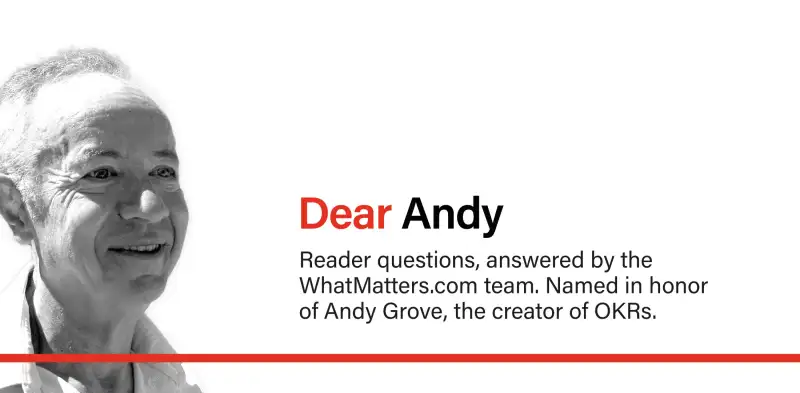Dear Andy,
I know OKRs have most famously been used for profit-driven organizations, but my work is in the nonprofit space and I believe OKRs apply equally as they would in a for-profit company. My question: Any thoughts/suggestions for implementing OKRs in a community challenged by a scarcity of human capital?
Also, we’re located in rural Mississippi and physical proximity matters for some of our work.
Thoughts? Suggestions?
Thanks,
Will

Hi Will,
You’re absolutely right that OKRs can be incredibly impactful in the nonprofit space. Your small team can’t be everywhere and do everything at once, so use OKRs to focus. Often you’ll travel further if all of you concentrate on fewer things, but do them together. This is especially true for any organization with limited resources.
Your organization’s website tells me your mission: Prepare leaders for tomorrow’s challenges by empowering learners, regardless of income, with a holistic approach that develops the head, heart, and hands, rooted in a faith-inspired community and inclusive African-American ethos.
This mission can’t be achieved in a single swoop. It may, in fact, take years. But what do you most need to do first? Another way to decode your priorities is to ask, “If the team could only accomplish one thing this year, what would it be?” Pick the single biggest thing that would have the most impact on your mission. You might have different perspectives on what matters most — that is normal. Have the discussion, and then commit to one outcome you will make your No. 1. We call this a North Star OKR.
In your case, it may be that the top priority is growing the number of learners you reach. Or maybe it’s reaching more leaders in a certain income range. Maybe you want to invest in the youth you already have and deepen (and measure) their leadership skills.
Whatever your top priority ends up being, write it as simply and memorably as you can. Like a good haiku. Then ask yourself how you would know you were succeeding at the quantity, speed, and quality that you want.
To give an example, the team from YMCA of the North, based in the Twin Cities, incorporates their mission into every OKR they write. One of their aims is to eliminate homelessness for young people. They pair this Objective with a set of Key Results for building the right ecosystem across the community. For the Y of the North, housing the regional homeless means setting measurable milestones for facilitating partnerships between government entities, nonprofit organizations, and major corporations.
What will it take to grow the number of learners you reach? What would happen if you allocate your resources (be it time, labor, or money) to achieving this one goal first? Once you’ve got those answers in place, you’re ready to get to work. We’ve seen this level of focus work gangbusters for company after company, and I hope it does for yours, too.
Thanks for writing in, Will, and best of luck to you and your team on your OKR journey!
Sincerely,
Billy from the What Matters Team




